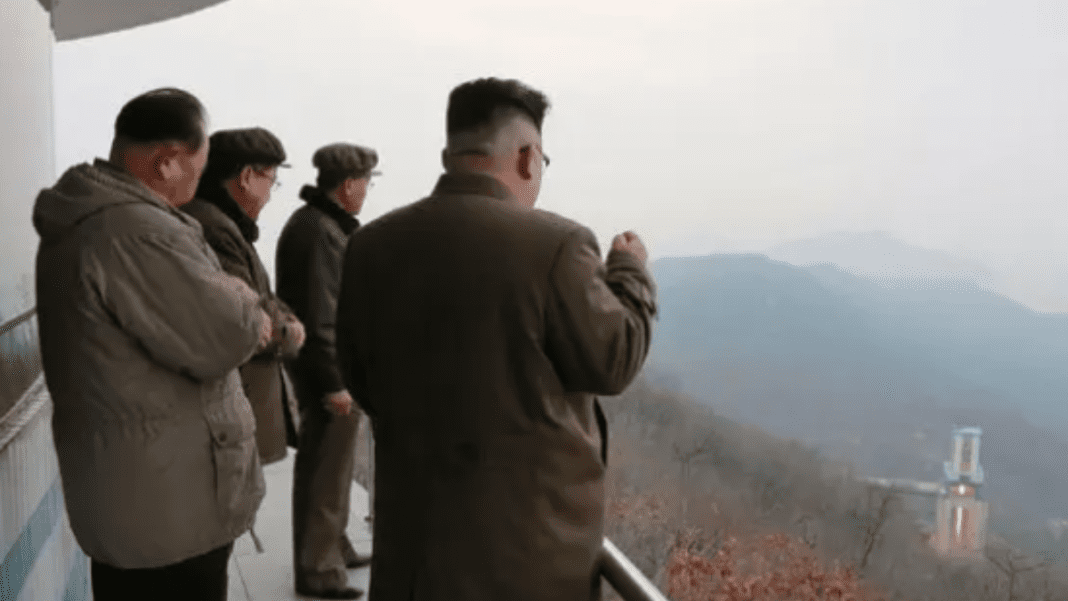The leader of North Korea, Kim Jong Un, personally attended an important missile test of a new rocket engine for long-range nuclear missiles. This was the ninth and final test in the development of a solid-fuel engine. North Korea’s state news agency, KCNA, confirmed that the test was successful. The country’s government said that this missile test shows that a full flight test of a new intercontinental ballistic missile (ICBM) could happen in the coming months.
Kim Jong Un Observes Important Missile Test of New Engine
Photos released by KCNA show Kim Jong Un watching the missile test through binoculars. Another image shows a red flame coming out of the rocket engine during the test. According to the agency, the test was for a “high-thrust solid-fuel engine made from composite carbon fibres.” It added that this missile test marks the “final stage in the development process” for the new rocket.
Kim Jong Un was quoted saying that the new engine “heralds a significant change in the expansion and strengthening of the country’s nuclear strategic forces.” Just one week before the test, North Korea unveiled its new missile called “Hwasong-20.” The government says this missile is a next-generation ICBM.
➡️ Japan warns of new nuclear threats from North Korea in explosive defense report
Experts believe that this missile test means North Korea is ready to start producing solid-fuel engines for its new missiles. Since the test is described as “final,” many expect that a full flight test may be carried out this year.
Solid-Fuel Engines Bring New Capabilities
Solid-fuel rockets offer several advantages over liquid-fuel types. Their engines are easier to transport and conceal from enemy forces. Additionally, they can be launched more quickly since they do not require fueling before launch. This makes them more effective in military operations.
According to experts, using carbon fibre materials in the engines makes them lighter and more resistant to heat. These materials help the rockets to travel farther and perform better. This means the new missiles can be launched with less risk of being detected and intercepted.
Christina Chapman’s $17M Fraud Scheme Funneled Millions to North Korea
North Korea has been testing missiles for years. Some of its earlier rockets could reach as far as the continental United States. The new solid-fuel technology makes it even easier for North Korea to move and conceal its weapons.
This latest missile test shows how the country’s weapons are becoming more advanced. Many analysts believe that North Korea’s missiles are now much more reliable and ready for military use.
North Korea’s Growing Alliances and Missile Test Focus
The recent missile test comes at a time when North Korea’s military ties with other countries are growing. Just days before the test, Kim Jong Un returned from Beijing, China. The visit was for a military parade celebrating Japan’s surrender in World War II. During the event, Kim stood with leaders from China and Russia.
North Korea’s relationship with Russia has strengthened in recent years. After Russia’s invasion of Ukraine more than three years ago, North Korea sent troops and weapons to support Russia. In return, experts believe Russia is helping North Korea with technical knowledge and equipment for its missile test and satellite programs.
Russia’s cooperation is helping North Korea improve its missile technology. Analysts believe that Russian assistance is making North Korea’s missiles more advanced and ready for military use instead of being considered crude weapons.
North Korea’s government has repeatedly said that it will not give up its nuclear weapons. Officials criticized calls from South Korea’s president to work towards nuclear disarmament. They described such calls as dishonest and said that their nuclear forces represent national honor and strength.
The new solid-fuel missile technology adds to this commitment. With lighter materials and better engines, North Korea’s military is making faster progress in its long-range missile development. The latest missile test shows that the country is serious about strengthening its nuclear force and military power.
